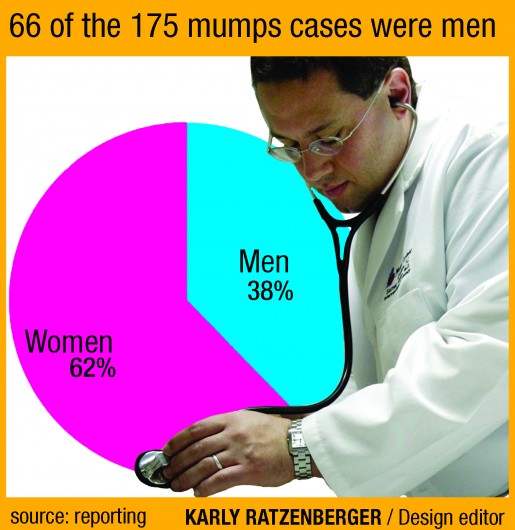Some male students said they are becoming concerned about their future ability to have children because mumps, which can cause infertility in about 10 percent of affected men, continues to spread at Ohio State.
As of Wednesday afternoon, 175 mumps cases had been reported in Franklin and Delaware counties, 111 of which were linked to the OSU outbreak, according to a Columbus Public Health press release. Of the total number of cases, 66 were men.
There were 12 more total cases and eight more OSU-linked cases reported as of Wednesday than had been reported Tuesday.
Dr. Gregory Lowe, an assistant professor in OSU’s Department of Urology, said swelling of the testicles is a common symptom of the mumps for men.
“What we see is that for men after puberty (who get mumps), obviously college students and young adults here in Columbus, somewhere around 15, even as high as 25 to 30 percent will develop some sort of (viral) swelling within the testicle, called orchitis,” Lowe said. “It can be on one side most often, or 20 percent of the time on both sides.”
Lowe said once students catch mumps, there isn’t much treatment to prevent infection of the testicles. There are treatments, though, including steroids and other techniques, to keep the virus from replicating further. Lowe also said getting the measles, mumps and rubella vaccine helps prevent swelling from happening.
“Only about one in five men with mumps will develop swelling in their testicles, and of those men, about half will have their fertility affected,” Lowe said.
Lowe said those with swelling in both testicles are at an increased risk, and men who are at risk should consider going to a sperm bank in case they have complications in the future.
“That’s something … if they need help with, they can call our office and get set up really easily,” Lowe said. “Even for the guys who do have fertility problems, we have several ways nowadays to help them father a child. Even when mumps wipes out sperm in the ejaculate, often we can still go into the testicle to find some sperm.”
Lowe said he recently spoke to a fertility group to ensure that mumps patients could have their sperm frozen, and said patients should do it as sooner rather than later if they’re interested.
“It seems like that’s not going to be a problem at all,” Lowe said.
Lowe said he hasn’t treated any patients yet with testicular swelling caused by mumps, but testicular swelling in general is treated regularly. For men who catch mumps but don’t have testicular swelling or pain, Lowe said there is almost no concern of infertility.
Alex Kaps, a second-year in computer science, said he would take more precautions to avoid getting the mumps because he knows about the possible fertility issues. He lives in a fraternity house, where he is in close contact with other students.
“(A fraternity house) is not the most clean place … but everybody (there) seems pretty healthy,” Kaps said.
Kaps said his fraternity gets warnings specifically related to men’s health sometimes, but the members haven’t been notified about the fertility problems caused by mumps.
Garrick Bryan, a second-year in economics, said the odds of catching mumps and getting swelling were too low for him to worry about his fertility, especially because he is vaccinated.
“It’s not impossible, but it’s pretty improbable,” Bryan said.
Ben Wallace, a first-year in dentistry, said he isn’t worried about getting mumps.
“I haven’t been worried about it at all, but I hadn’t really heard about (fertility issues), so I suppose if I get it, I’ll be concerned,” Wallace said.
People infected were advised by Columbus Public Health to stay home for five days after symptoms begin, and anyone who wasn’t vaccinated was encouraged to receive two doses of the MMR vaccine to protect themselves.
Jose Rodriguez, spokesman for Columbus Public Health, though, said in March those who have received two doses of the MMR vaccine still have a 10 to 20 percent chance of being infected.
Mumps is a viral infection of the salivary glands, according to the Centers for Disease Control and Prevention website. It can spread through coughing, sneezing or contact with saliva or mucus. According to the CDC website, the disease can be carried without any symptoms.
Those who are affected by mumps might also have swollen and tender salivary glands under the ears or jaw on the side of the face, fever, headache, muscle aches, tiredness and loss of appetite, according to the CDC. The website said there is no specific treatment for mumps, but it is usually gone in a week or two.



